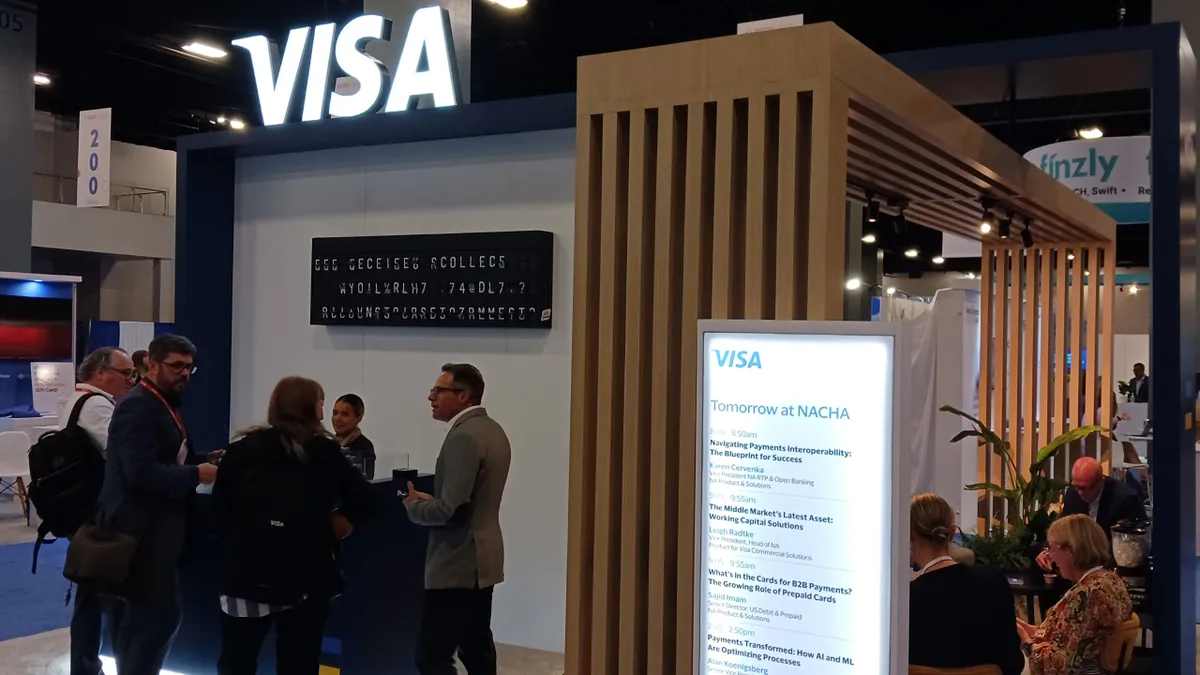The upcoming launch of FedNow might present more payments competition for the ACH Network, but Nacha CEO Jane Larimer largely envisions that forthcoming real-time service meeting different payment needs.
Speaking to a crowd of payroll professionals Monday, the CEO of the organization that oversees the ACH Network acknowledged the July arrival of the federal government’s instant payments system bringing another contender into the electronic payments space.
“On one level, every payments system competes against each other, right?” Larimer said. She and William Sullivan, Nacha’s senior director and group manager of government and industry relations, discussed electronic payment developments with KPMG Managing Director Mindy Mayo at the American Payroll Association’s conference in Arlington, Virginia this week.
Competition aside, there are payment system attributes that appeal to users in different scenarios. As the public and private sectors both work to speed up payments, FedNow is likely to fill gaps left by the ACH Network, Larimer said.
In a payroll setting, those mainly involve payment timing, whether it’s an employee who needs to be paid on a holiday, an immediate payment for an employee who’s been terminated, or the ability to pay an employee several times per day, Larimer told the crowd.
Real-time payments that settle immediately might be better suited for high-priority situations, whereas direct deposit through ACH is efficient and reliable for standard payroll duties, she said.
As people need or want money more often, or at times when the traditional banking system isn’t open, “instant payment systems can be a great way to fill those gaps,” Larimer said. There’s already a private real-time payments system in operation called RTP, which is operated by The Clearing House.
Payment trends such as earned wage access – providing employees with earlier access to their paychecks – have gained steam in recent years, The private sector is embracing ever-faster payments in a variety of use cases, sometimes bypassing the ACH system. For instance, this week, Amazon said it would add a faster payout capability for merchants, including on weekends.
These developments haven’t gone unnoticed by Nacha: The organization has progressively made changes to adapt to an environment prizing faster and more frequent payments.
The ACH Network currently settles four times each day: three times intra-day and one time overnight, Larimer said. Nacha and the ACH operators – The Clearing House and the Federal Reserve – added late-night ACH services last November to enhance their transfer services.
Nacha is focused on improving the ACH system to ensure “we have the characteristics and the attributes on the payment system that our end users and our processors and our financial institutions need and want,” Larimer said.
Still, the ACH Network operates within the confines of Fedwire and the National Settlement Service, which is run by the Fed, Larimer noted.
“It wasn’t a Nacha decision not to pay on Saturday or a holiday,” Sullivan told the payroll crowd. “It's because there’s no National Settlement Service during those times.” The Fed has talked about expanding those hours, “and I think they will,” Sullivan added.
If the National Settlement Service offers longer hours in the future, Nacha aims “to see how we can move within that space, to have additional settlement windows,” Larimer said.
To that end, Nacha wants to make sure the U.S. is covered from a same-day ACH perspective, Larimer said. She noted the last settlement window for the West Coast closes at 3 p.m., so adding another time later in the day for that region, including the Pacific and Mountain time zones, would be beneficial.i
“I think that the future is going to a place where you’re looking at 24-by-7 payments and banking and accounting for the banks,” Larimer said.
That’s not going to happen next week or even next year, she said, and once change does occur, it takes large companies and processors time to adjust their back-ends to take advantage of payment system changes, she said.
But “my hope is that someday the ACH will be settling every day of the week,” she said.



















